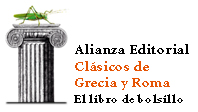Persuasión y política en Praecepta gerendae reipublicae y Vidas paralelas de Plutarco: un abordaje intertextual de los modelos de paideíaPersuasion and politics in Plutarch’s Praecepta gerendae reipublicae and Parallel Lives: an intertextual approach to models of paideia</e
Analía Sapere
Universidad de Buenos Aires-CONICET
Resumen
El objetivo del trabajo es analizar el vínculo que establece Plutarco entre la activEl objetivo del trabajo es analizar el vínculo que establece Plutarco entre la actividad persuasiva y la actividad de gobierno. Para ello, analizaremos específicamente los capítulos de Prae¬¬cepta gerendae que se dedican a la retórica (5-9) y los pasajes de las Vidas que son allí aludidos (Cimón 16; Alcibíades 10; Pericles 8 y 9; Demóstenes 5, 6, 8 y 10; Cicerón 1, 4, 5 y 6; Catón el Viejo 7-9; Foción 1, 5, 14, 21 y 23; César 13, Catón el Joven 5 y 31), a los efectos de acercarnos a una comprensión acabada del pensamiento del autor. Se advierte que en Praecepta gerendae reipublicae el interés por la retórica es fundamentalmente práctico, pues se privilegian los usos persuasivos que sean útiles para el gobernante en su tarea de dominar al pueblo. La lectura de las Vidas complementa esta mirada, pues en ellas encontramos un sustento filosófico y moral para la retórica aplicada a la actividad política, lo que debe ser tenido en cuenta para ponderar la opinión general de Plutarco sobre el tema.idad persuasiva y la actividad de gobierno. Para ello, analizaremos específicamente los capítulos de Praecepta gerendae que se dedican a la retórica (5-9) y los pasajes de las Vidas que son allí aludidos (Cimón 16; Alcibíades 10; Pericles 8 y 9; Demóstenes 5, 6, 8 y 10; Cicerón 1, 4, 5 y 6; Catón el Viejo 7-9; Foción 1, 5, 14, 21 y 23; César 13, Catón el Joven 5 y 31), a los efectos de acercarnos a una comprensión acabada del pensamiento del autor. Se advierte que en Praecepta gerendae reipublicae el interés por la retórica es fundamentalmente práctico, pues se privilegian los usos persuasivos que sean útiles para el gobernante en su tarea de dominar al pueblo. La lectura de las Vidas complementa esta mirada, pues en ellas encontramos un sustento filosófico y moral para la retórica aplicada a la actividad política, lo que debe ser tenido en cuenta para ponderar la opinión general de Plutarco sobre el tema.
Palabras clave: Retórica; intertextualidad; Plutarco; política
Abstract
This paper aims to analyse the connection that Plutarch establishes between persuasive activity and governance. To achieve this, I will examine the chapters of Praecepta gerendae dedicated to rhetoric (5-9) and the passages from the Lives that are referred to there (Cimon 16; Alcibiades 10; Pericles 8 and 9; Demosthenes 5, 6, 8 and 10; Cicero 1, 4, 5 and 6; Cato the Elder 7-9; Phocion 1, 5, 14, 21 and 23; Caesar 13, Cato the Younger 5 and 31) to reach a complete understanding of the author’s thought. It is noted that in Praecepta gerendae reipublicae, the interest in rhetoric is fundamentally practical, as it prioritizes persuasive uses that are useful for the ruler in their task of governing the people. The Lives complement this perspective, as they provide a philosophical and moral foundation for the rhetoric applied to political activity, which must be considered to evaluate Plutarch’s overall opinion on the subject.
Keywords: rhetoric; intertextuality; Plutarch; Politics
Referencias bibliográficas
Aalders, G.J. D. (1982) Plutarch’s Political Thought, Amsterdam, Oxford, New York, North, Holland Publishing Company.
Anderson, G. (1993) The Second Sophistic. A Cultural Phenomenon in the Roman Empire, London, New York, Routledge.
Anderson, G. (2007) «Rhetoric and the Second Sophistic» en W. Dominik, J. Hall (eds.) A Companion to Roman Rhetoric, Oxford, Blackwell, 339-353.
Beck, M.A. (2010) «Plutarch’s hypomnemata», en M. Horster & C. Reitz (eds.) Condensing Texts. Condensed Texts, Stuttgart, Franz Steiner Verlag, 349–36
Bowersock, G. (1965) «Some Persons in Plutarch’s Moralia», CQ 15(2), 267-270.
Carrière, J. C. (1984) «Notice» en J. Carrière, M. Cuvigny (eds.), 3-69.
Carrière, J. C.;Cuvigny, M. (eds.) (1984) Plutarque, Oeuvres morales, Tome XI, 2e partie. Traités 52 et 53, Paris, Les Belles Lettres.
Chrysanthou, C. S. (2019) «Orator-politician vs. Philosopher: Plutarch’s Demosthenes 1–3 and Plato’s Theaetetus», Classical World 112(2), 39-55, doi:10.1353/clw.2019.0002.
Cooper, C. (2008) «The Moral Interplay Between Plutarch’s Political Precepts and Life of Demosthenes», en A. Nikolaidis (2008) The Unity of Plutarch’s Work: ‘Moralia’ Themes in the ‘Lives’, Features of the ‘Lives’ in the ‘Moralia’, Berlin, New York, Walter de Gruyter, 67-83.
Denniston, J. D. (1966) The Greek Particles, Oxford, Clarendon Press, 2nd edition with corrections.
Desideri, P. (1986) «La vita politica cittadina nell’impero: lettura dei ‘Praecepta gerendae rei publicae’ e dell’ ‘An seni res publica gerenda sit’», Athenaeum 64, 371.
Duff, T. E. (2008) «Models of education in Plutarch», JHS 128, 1-26, doi:10.1017/S0075426900000033
Flacelière, R. et E. Chambry (eds.) (2003) Plutarque, Vies (XVI tomes), avec le concours de M. Juneaux pour les t. I et II, 2e tirage, Paris, Les Belles Lettres.
Gastaldi, S. (2017) «‘Governi, Ma Sei Governato’: La Figura del Politico-Attore nei Praecepta Gerendae Rei Publicae di Plutarco», Il Pensiero Politico 50(2), 159-179.
Goldhill, S. (2009) «Rhetoric and the second sophistic», en E. Gunderson (ed.), The Cambridge Companion to Ancient Rhetoric, Cambridge, University Press, 228-241.
Harrison, G. W. (1987) «Rhetoric, writing and Plutarch». AncSoc 18, 271-279.
Hershbell, J. P. (2008) «Plutarch on Solon and Sophia», en A. Nikolaidis (ed.), The Unity of Plutarch’s Work: ‘Moralia’ Themes in the ‘Lives’, Features of the ‘Lives’ in the ‘Moralia’, Berlin, New York, Walter de Gruyter, 489-499.
Jacobs, S. G. (2017) Plutarch’s Pragmatic Biographies Lessons for Statesmen and Generals in the Parallel Lives, Leiden, Brill.
Jones, C. P. (1966) «Towards a chronology of Plutarch’s works», JRS 56(1-2), 61-74.
Marín Valdés, F. (2008) Plutarco y el arte de la Atenas hegemónica, Oviedo, Universidad de Oviedo.
Mittelhaus, K. (1911) De Plutarchi praeceptis gerendae rei publicae. Berlin.
Mossman, J. (1999) «The Failure of Rhetoric in Plutarch’s Demosthenes», Histos 3, 77-101.
Pérez Jiménez, A. (2002a) «Exemplum: the Paradigmatic Education of the Ruler in the Lives of Plutarch», en P. Stadter, L. Van der Stockt (eds.) Sage and emperor: Plutarch, Greek intel-lectuals, and Roman power in the time of Trajan (98-117 A. D.), Leuven, University Press, 105-11.
Pérez Jiménez, A. (2002b) «Ὁ λόγος ὡσπερ δεὺτερον σῶμα. La elocuencia como instrumento político en las Vidas paralelas de Plutarco». CFC(G) 12, 253-270.
Pernot, L. (2017) «Rhetoric and the Greco-Roman Second Sophistic» en M. J. MacDonald (ed.) The Oxford Handbook of Rhetorical Studies, Oxford, University Press 253-266.
Russell, D. A. (1966) «On Reading Plutarch’s ‘Lives’», G&R (SS) 13/2, 139-154.
Russell, D. A. (2023) «Language, Style and Rhetoric», en F. B. Titchener (ed.) The Cambridge Companion to Plutarch. Cambridge, University Press.
Stadter, P. (1988) «The Proems of Plutarch’s Lives», ICS XIII.2, 275-295.
Stadter, P. A. (1987). The Rhetoric of Plutarch’s Pericles», AncSoc 18, 251-269.
Stadter, P. A. (1989) A Commentary on Plutarch’s Pericles, Chapel Hill, University of North Carolina Press.
Stafford, E. J. (1999) Plutarch on persuasion. Plutarch’s Advice to the Bride and Groom and Consolation to his Wife: Translation, Commentary and Interpretative Essays, New York, Oxford, Oxford University Press.
Trego, K. M. (2016) «Do As I Say and As I Do: Lessons on the Use of History for the Civic Statesman in Plutarch’s Praecepta». CW 109(3), 357-379.
Tsiampokalos, T. (2020) «Defining Rhetoric While Playing with Pre-texts: Some Aspects of Intertextuality in Plutarch’s Praecepta gerendae reipublicae 801C–D», en T. Schmidt et al. (eds.) The Dynamics of Intertextuality in Plutarch, Leiden, Brill, 495-510.
Tsiampokalos, T. (2021) Let’s talk about rhetoric! Plutarch’s position within a long, ideologically burdened tradition in the history of education, Leuven, University Press.
Tsiampokalos, T. (2024) Plutarch and Rhetoric: The Relationship of Rhetoric to Ethics, Politics and Education in the First and Second Centuries AD, Leuven, University Press.
Vamvouri, M. (2020) «Plutarch and the Academic Reader» en T. Schmidt et al. (eds.) The Dynamics of Intertextuality in Plutarch, Leiden, Brill, Leiden, Brill.
Van der Stockt, L. (1999a) «A Plutarchan Hypomnema on Self-love», AJPh 120, 575-99.
Van der Stockt, L. (1999b) «Three Aristotles Equal but one Plato. On a Cluster of Quotations in Plutarch», en A. Pérez Jiménez et al. (eds.), Plutarco, Platón y Aristóteles. Actas del V Congreso Internacional de la I.P.S. (Madrid-Cuenca, 4-7 de Mayo de 1999), Madrid, 127–140.
Van der Stockt, L. (2004) «Plutarch in Plutarch: The problem of the Hypomnemata», en I. Gallo (ed.) La Biblioteca di Plutarco, Atti del IX Convegno plutarcheo Pavia, 13–15 giugno 2002. Naples, 331–40.
Van der Stockt, L. (2014) «Compositional Methods in the Lives», en M. Beck (ed.) A Companion to Plutarch, Oxford, Blackwell, 321–332.
Van der Stockt, L. (ed.) (2000) Rhetorical theory and praxis in Plutarch: Acta of the IVth International Congress of the International Plutarch Society, Leuven, July 3-6, 1996, Leuven, Peeters Publishers.
Verdegem, S. (2010) Plutarch’s Life of Alcibiades. Story, Text and Moralism, Leuven University Press.
Xenophontos, S. (2012) «Plutarch’s Compositional Technique in the An Seni Respublica Gerenda Sit: Clusters vs. Patterns», AJPh 113.2, 61–91.
Xenophontos, S. A. (2013) «Imagery and Education in Plutarch», CPh 108(2), 126-138.
Zadorojnyi, A. V. (2012) «Mimesis and the (plu) past in Plutarch’s Lives», en J. Grethlein, C. Krebs (eds.) Time and Narrative in Ancient historiography: the ‘Plupast’from Herodotus to Appian, Cambridge, University Press, 175-198.
Revista
-
Sobre la revista
Página principal
-
Estatutos
Estatutos de la Revista Estudios Clásicos
-
Código ético
Declaración de buenas prácticas
-
Normas de recepción y envío
Indicaciones para envíos de artículos
-
Equipo editorial
Consejos de redacción y asesor
-
Comité de honor
Comité de honor
Información
-
Para autores
Publicar con nosotros
-
Para evaluadores
Normas para evaluar artículos
-
Para bibliotecas
Información bibliográfica
-
Contacto
Cuestiones y preguntas
Publicar en EClás
-
Envío de originales
Artículos y reseñas
-
Normas de publicación
Descarga normas en PDF
-
Estilo CSL EClás
Estilo CSL EClás
-
Índices de calidad
Bases de datos e impactos


 c/ Serrano, 107
c/ Serrano, 107